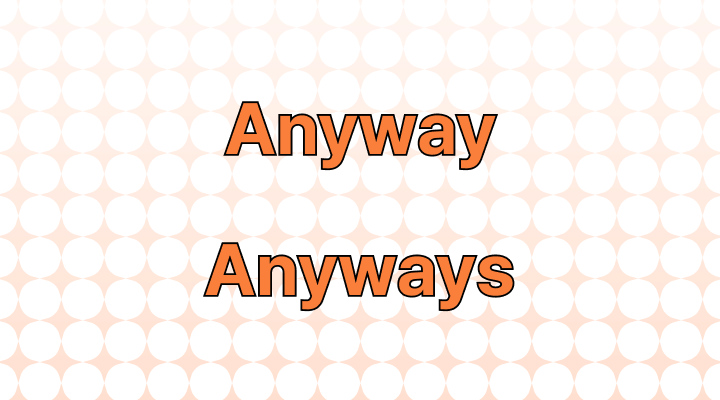Anyway indicates a shift in focus, introducing a contrasting idea, or concluding a discussion. It is the standard and formal form. Anyways is the informal variant of anyway.
As you can see from Google Books Ngram Viewer, anyway is more frequently used in literature.

Anyway and anyways are two words commonly used in spoken and written English. They are often used interchangeably, but there are subtle differences in their usage and acceptability.
What does anyway mean?
- Anyway is the standard and more widely accepted form in formal writing and speech.
- It is an adverb used to indicate a shift in focus or to introduce a contrasting idea or a conclusion. It is often used to close a discussion or to return to the main point after a digression.
Example sentence
- I know it's late, but let's go to the party anyway.
More example sentences
- I didn't want to go to the movie, but I went anyway because my friends were excited about it.
- The weather forecast said it would rain, but I went for a hike anyway and got caught in a downpour.
- Anyway, let's not dwell on the past; what can we do to improve the situation now?
- She's always late to meetings, but we start them anyway to make the best use of our time.
- I know I shouldn't have dessert, but I'm going to have a small piece of cake anyway.
What does anyways mean?
- Anyways is considered more informal and is often used in casual speech or writing, particularly in some regional dialects or in everyday conversation.
- It essentially serves the same function as "anyway," indicating a shift or a return to the main point, but some style guides and grammarians frown upon its use in formal contexts.
Example sentence
- I don't think it's a good idea, but let's do it anyways.
Common idioms/phrases
Anyway:
- In any case: This phrase means regardless of what happened or will happen and is used to introduce a new topic or emphasize a point.
- Example: "I didn't want to go to the party, but in any case, I ended up having a great time."
- Any way you slice it: This phrase is used to say that a situation or outcome is the same, regardless of how it is approached or examined.
- Example: "Any way you slice it, this project is going to be challenging."
Anyways:
- Anyways and means of transportation: In some regional dialects, especially in North America, "anyways" is used informally and colloquially in phrases related to modes of transportation, such as "anyways, we finally got there" to mean "regardless, we arrived."
In summary, "anyway" is the more proper and formal choice in writing and should be used in academic, professional, or formal settings. "Anyways" is more acceptable in casual speech and informal writing, but it's best to avoid it in situations where a more standard form of English is expected. However, it's essential to be aware of the context and audience when deciding which word to use, as language can vary based on region and personal preference.
Want to sound like a native speaker?
Engram’s AI-powered grammar checker makes your English sound like a native speaker’s, suggesting natural English expressions on top of fixing grammar, spelling, punctuation, word order, and vocabulary.

Reference














